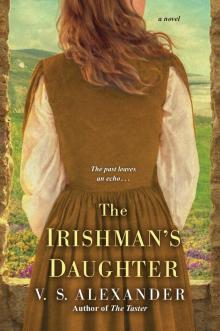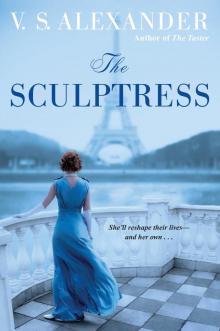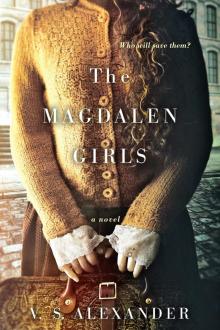- Home
- V. S. Alexander
The Irishman's Daughter Page 30
The Irishman's Daughter Read online
Page 30
Church bells pealed; muffled snores arose from open windows. Children laughed, or cried in pain, from the depths of clapboard houses. Dim Irish voices sounded in her ears, but many of the accents were strange and unintelligible. She gazed at the houses, some tilting at an angle from dereliction. Some doors couldn’t be shut, yellowed newspaper covered cracked windows, and piles of stinking garbage clogged the lane.
Anxiety prickled up her arms and into her chest. Was this the promised land of America? Neither she nor her sister nor anyone in her family really knew what Boston would be like. Everyone assumed—like those heading to England to find work—that life must be better outside of County Mayo. Perhaps living like this was preferable to starving by the side of a road, but if this was what America promised, the outcome she imagined was no better than living in a slum in Dublin or Manchester.
She walked carefully, dodging the slop and garbage, preoccupied with the squalor around her. What kind of life was she offering her newborn? She banished the question from her head, hoping that when Rory and her father arrived, the family situation would improve. Rory and Lucinda would find enough work to provide a reasonable accommodation for the family, and when the baby was old enough that her father could take care of it, she would also find work. Then their troubles would be over, and America would be a welcome home. Perhaps they could buy a small farm outside the city and grow their own potatoes, breed their own goats and pigs. The thought of having her husband and father close again brought her hope. But what of Ireland?
She passed a small square that held a plot of pale green grass. The color wasn’t the rich, deep emerald of the land she loved. The sight saddened her and made her more homesick than ever. The houses closed around her again.
Briana heard the woman’s County Mayo accent before her head poked from the doorway. Eager to contact anyone who might be considered a neighbor, she picked up her step. The woman wore a white blouse, a plain gray dress, and black shoes stitched along the sides. Nestled in the folds of her dress was a child—a small boy of five or six—whose eyes were as red as the top of his head.
Briana slowed and gave the woman a look but decided to get no closer in case the child was sick. She couldn’t tell if he was ill or showing the results of a good cry.
The woman looked at Briana with a face filled with pride and courage rather than contempt or fear as she brushed back a wisp of red hair that had curled against her forehead.
Briana admired her courageous stance and asked in Irish, “Are you from Mayo?”
The woman scoffed, as if she couldn’t believe Briana would have the gall to ask such a foolish question. “You must be new to Boston,” she answered.
Briana felt like a fool and clasped her hands together.
The boy scrunched up his mouth and looked at her suspiciously.
“Yes,” Briana answered.
“How new?”
Briana stepped closer to the stairwell that concealed the pair.
The woman shook a finger, bent over, and wrapped her arms around the boy’s shoulders. “I wouldn’t come closer—I don’t know what’s ailing him—a cold or something worse, but from the looks of you, you have no business approaching sick strangers with a baby in your belly.”
She stopped. “A few weeks in the city. We’re staying at a boarding house on Beacon Street.”
The woman eyed her up and down. “Oh, the Newton. That costs enough to feed us for six months.”
The sarcasm in her voice stung Briana. She had hoped to find something different in Boston—a friendly Irish community that stuck together despite the hardships thrown at them. She had no desire to spar with the woman. “I’ll be on my way.” Briana shifted, her hands resting on her waist.
The woman hesitated for a moment before asking, “What’s your name?” Her tone was kinder now.
“Briana Caulfield from Lear House, near Carrowteige.”
“Lear House? Never heard of it.” She smiled. “I’m sorry. I didn’t mean to be rude, but everyone on this block is from Mayo. We all ended up here and you’ve wandered square into it. Roscommon’s a block away.” She sat on the step above her son and stroked his curly red hair. “Addy Gallagher, and this is my son, Quinlin. He’s named after my father, who came from even farther north in our country than we did.”
Briana looked at her expectantly.
“Ballycroy. My husband and I used to farm east of the town . . . until the . . .” Her eyes clouded over and she grimaced.
Briana nodded. “I understand.”
“I’d ask you to come in, but there’s no place to sit with twenty-five of us in the house and some children in worse shape than my Quinlin.”
Twenty-five? The house had two stories, but she couldn’t imagine that many people in such a small dwelling. “Where are they from?”
“All over Mayo, but most not as far north as you.”
She fidgeted, her fingers unintentionally forming closed fists, which she opened and closed to release the tension. “I’m sorry to bother you. I have to get back or my sister will be worried.”
The woman looked at her with longing eyes, as if she wished she could leave her cramped home behind.
A callous veneer enveloped Briana’s heart, and the unsympathetic feeling distressed her. She had witnessed horrible scenes in Ireland, but she’d never expected similar conditions in America. It saddened her to see Addy and her son in such deplorable conditions, yet she could do little to help them. Clearly Addy had no money and, most likely, little to eat, but charity had to begin at home. She and her sister had to be prudent. The woman was right—room and board was expensive at the Newton on Beacon. Their money wouldn’t last forever. The only way to keep her spirits up was to recognize that life here might be as hard as in Ireland and then go on her way, leaving them behind—a cold thought that pierced her soul.
She had turned away when Quinlin coughed and cried out in pain. The boy doubled over on the step and clutched his stomach.
Instinctively, she ran toward him. Addy thrust out her hands, entreating her to come no closer.
“What’s wrong, Quinlin?” Briana asked. Sweat broke out on the boy’s forehead.
“Don’t know,” the child answered. “My stomach hurts.”
Addy wiped away his tears. “I know what’s wrong, and I can do nothing about it,” she told Briana.
“What is it, Addy, tell me? Maybe I can do something.”
“Maybe it’s the same as killed my husband and forty-one others on the Elizabeth and Sarah. We left Killala in July and didn’t get to Quebec until this month. We threw my husband, naked as the day he was born, into the sea. My son and I had nothing, and if it hadn’t been for the kindness of a few others who were coming, we wouldn’t have made it to Boston.” She clasped her hands together as if in prayer. “I regret the day we boarded that ship. If only we’d known, we’d never have sailed. We’d have taken our chances in Mayo. My husband told me the night before he died he’d rather have given his body back to Ireland than be delivered to the Atlantic.”
She wanted to reach for Addy, and the woman read the gesture from her eyes.
“Don’t touch me,” she said, unwilling to accept a sympathetic hand. “Who knows if I have it too.” She peered at her son. “He’s been on the pot for a couple of days now. He can’t hold anything down. I didn’t know he had slipped out of bed until I woke up. He was sitting on the step, shivering like he’s half crazed, when I found him.”
Briana studied the boy. His face and fingers had a withered look about them. She had been told about the fever, but Father O’Kirwin had described an even worse disease called cholera. Quinlin’s feverish eyes had no bluish ring around them, and they weren’t sunken in their sockets. His skin was still warm and red, not the translucent blue of the cholera victim.
“I think he ate something he shouldn’t,” Addy said. “He was fine until a few days ago. He even escaped the plague on the boat—but if—he . . .” She turned her head away and cried.
“I’ll find a doctor,” Briana said as Addy sobbed.
“We’re all so close, living on top of each other.” She wiped her nose on her arm. “I try to keep up, but I’ll be indebted to you for anything you can do for my son.”
“I’ll do my best. I’ll remember your name—Addy Gallagher.” Briana looked up and positioned the house by the sight of the Christ Church steeple.
“It’s famous,” Addy said, drying her eyes and attempting to smile. “A man hung lanterns there during the American Revolution. Everyone in the house says we’re lucky to live by such an important church, but I don’t think an Irishman is allowed to step inside.”
Briana forced a smile. Maybe the church was important, but living in its shadow didn’t do any good for the thousands of Irish who were struggling to make this land their home. She waved good-bye to Addy and Quinlin and struck off toward the boarding house. In the forty minutes it took to get home, all she could think about was the sad woman and her sick son.
* * *
Lucinda arrived at the boarding house about an hour after Briana. Her sister wore an unseemly frown, a sober look equaling her own disquiet, and appeared to be in no mood to talk. Briana hesitated to bring up the visit to Declan Coleman in case something unpleasant had happened. Lucinda removed her sweater, rearranged a few things on their small desk, and then disappeared down the hall. Briana lay on her small bed and watched the afternoon sun inch across the windowsill.
When Lucinda returned, she burst forth with the angry words, “How dare they!”
“Who?” Briana asked, wanting to know but not wishing to incite her sister’s rage.
“Bostonians—the English—all the puritans who live here.” Lucinda plopped on her bed and gripped the spread with both hands. “We may have to move in with the Colemans because”—she paused, allowing her anger to steep—“because it seems there are few jobs for us unless we are willing to shovel dirt or haul lumber. Who knows? Perhaps we can lay railroad ties.” Lucinda’s unexpected laugh brimmed with sarcasm.
“I’ve seen it. It’s worse than I expected.” She understood why her sister would be frustrated. It only made sense, now that they had experienced what Boston had to offer the Irish.
Lucinda continued, ignoring Briana’s words. “You’ll be lucky to get a job as a laundress, while I, because of my teaching abilities, might have the privilege of serving some high-minded society lady her tea.” She shook her head in amazement. “Can you imagine? We’ve traveled three thousand miles to be cooped up in this infernal house with no prospect for a decent job. Mr. Coleman told me how hard it is for Irish women to get along here. I was indulging in a fairy tale hoping that those “no Irish” signs didn’t apply to us. Even our men are little more than cattle, driven to haul dirt, dig ditches, fill in swamps. He and his wife live somewhat comfortably because he’s a skilled woodworker. Otherwise, they’d be as unfortunate as we.”
“It’s hell, Lucinda. I’ve seen it.”
Turning a deaf ear again, Lucinda continued to stoke her fury. “The Colemans have a room about the size of this on the third floor they now use for storage. It would be too hard for you in the last months of your pregnancy to deal with the steps even if they cleaned it out. The kitchen is in the basement. We can’t have the second story yet because Declan believes his sisters may yet come.”
Briana sat up and glared at her sister. “I understand. Can I tell you about my day?”
“I’m thinking about both of us,” Lucinda fumed. “What’s so important?”
“We’re not only dying in Ireland, we’re dying here, too. A boy . . .”
“God in heaven, preserve us from my sister who thinks she can save the world.”
Briana gazed at her hands. What could she do with them? Perhaps she could wash or sew, for she had experience at both. But what of the boy? She couldn’t get Quinlin’s face out of her mind. “He needs a doctor.”
“You have no business being around sick children,” Lucinda said. “For God’s sake, Briana, you’re going to have a baby in four months. Don’t be a fool.”
“I won’t be near him if I can help it, but I’m sending a message to Mr. Coleman. Maybe he knows a doctor who can help.”
“If you must, but I hope his services are free.” Lucinda moved to the desk, where she wrote in the small expense book she kept there.
“Yes, sister.” Briana shifted to the edge of her bed so she could look out the window. The sun had dropped below the buildings that sloped to the west. The distant trees had begun to turn from leafy green to orange and red.
After a few minutes, she left her sister and walked downstairs to the front desk. A young woman on duty dispatched a boy to the Coleman residence with Briana’s message. The delivery cost only a few cents, but she knew her sister would be upset with her “frivolous” spending. Lucinda didn’t need to know. Thinking of Rory and her father and Quinlin, Briana made up her mind that she must find work soon, whatever the cost, or they might end up like Addy.
CHAPTER 17
The proprietress knocked on the door early the next morning to say a man named Declan Coleman wanted to speak to Briana. Lucinda had already left the room for her morning bath. Briana dressed quickly and dashed downstairs, not wanting to keep Declan waiting.
He stood near the desk, dressed in a scruffy pair of work-pants and a loose-fitting shirt. Declan’s blue eyes flashed and he broke into a broad smile when he saw her descending the staircase. He extended his hand, which Briana shook.
“It was a pleasure to see your sister,” he said in Irish. “I’m glad she was able to meet my wife. I’m fortunate that I don’t have to work on Sunday.” His warm hand released hers, and he ushered her toward two chairs near the front window looking out on Beacon Street. “Please.” He gestured to one of the chairs.
She sat and clasped her hands in her lap.
“From your note, I see that you ventured north of the waterfront to Christ Church?”
She nodded. “I wanted to take a walk while my sister visited you.” Her memory of the overcrowded homes and the sick boy brought a lump to her throat. “I had no idea of the terrible conditions here.”
Declan sighed. “Many don’t.” He gazed out the window at the men who sauntered by wearing suits and hats on their way to work. “My job is not far from here, and I can’t be late, but you wanted to know about a doctor.”
Briana scooted forward in her chair. “Can you help?”
“I’ll do what I can, but I can’t guarantee anything. There are so many sick children and adults, all poor, who must fend for themselves. That’s why so many of them die. Most Boston doctors won’t give them a look without payment, and I don’t know any Irish men of medicine.”
Briana sank in her chair, thinking of Quinlin’s pale face and red-rimmed eyes. “I can’t get him out of my head. He may be dying while we’re sitting here.”
“Unfortunately, it’s all too common and probably going to get worse if more Irish come to Boston.” He cocked his head and put a finger to his lips. “I do know a man by the name of Furey, who comes from Roscommon. My supervisor knows him and introduced me to him. He gave a family on our block some medicine when their children were sick. I’ll see if I can get something from him that will help the boy.”
Briana’s spirits brightened not only at the news that Quinlin might get help but at the kindness of Declan, who seemed to be one of the most generous men she had ever met. She had been right in her assessment of him as a good, decent man. “That would be wonderful. I can deliver it if I have to.”
Declan rose from his chair. “Your sister wouldn’t approve considering your condition, and I’m not sure that I do either, but I’ll get in touch with Mr. Furey. If he can do something, I’ll come by with the medicine.”
Briana pushed herself up from the chair. The baby was beginning to weigh her down. “That would be so kind.”
He took her hand again. “My pleasure. Now I must get to work.”
A soft light filled
his eyes as he waved from the door and smiled. The look was a knowing one that she had only experienced with Rory. It spoke of mutual respect and admiration and possibly even love given the right circumstances. Her breath caught for a moment as she caught his glance and suddenly felt ashamed of admiring another man besides her husband. Did Declan think the same of her? A blush warmed her cheeks as she trudged upstairs to her room. If Rory wasn’t an ocean away he could see her swelling stomach, touch her belly, and feel the child inside. If he were here, he would tell her how much he loved her and how beautiful she was. Rory would protect her and keep the family safe from harm. She knew that as surely as the sun would rise.
Instead of conjuring up Rory, Briana had to deal with Lucinda, who sat on her bed brushing her wet hair. Scowling, she vented her impatience with Briana by asking, “Where did you sneak off to?”
“Declan Coleman was here,” Briana answered.
Lucinda was silent, but judging from her dour expression, she was hurt by her exclusion from their meeting. “You were in the bath. Declan hopes to get medicine for the boy I saw yesterday.”
Lucinda grimaced. “You should leave these people alone. Involving yourself may bring trouble down upon us.”
Briana gathered bath soap and started for the door. “I don’t feel that way . . . at all.”
Lucinda brushed her hair in fevered strokes. “Once again, I will be looking out for both of us as I go out seeking work.” She threw the brush on her bed. “You may sit here and dream of saving the world.”
“We’ll be going together if you’ll wait a few minutes,” Briana said tersely. She would find a job before her sister could even think of finding one! She composed herself and knocked on the bathroom door. No one was inside. She locked the door and filled the tub with hot water that had been hauled up by the scrub women.
As she sank into the warm water, she tallied up the losses her sister had experienced as well. Her hopes of a courtship with Sir Thomas and employment on the Continent had been dashed upon the bad fortune of Irish fields. And there was Lear House. She and her sister had been apart so much in the past two years, Briana had begun to think of Lucinda as an acquaintance rather than a blood relative. Their separation had marked their differences rather than brought them closer. And in Briana’s rush to marry, and the horrors of the famine, she and Lucinda had little time to grow closer.

 The Irishman's Daughter
The Irishman's Daughter The Sculptress
The Sculptress The Taster
The Taster Her Hidden Life
Her Hidden Life The Magdalen Girls
The Magdalen Girls